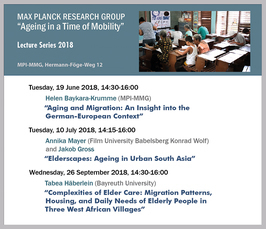"Complexities of Elder Care: Migration Patterns, Housing, and Daily Needs of Elderly People in Three West African Villages"
Max Planck Research Group “Ageing in a Time of Mobility” Lecture Series 2018
- Date: Sep 26, 2018
- Time: 02:30 PM - 04:00 PM (Local Time Germany)
- Speaker: Tabea Häberlein (Bayreuth University)
- Tabea Häberlein holds a PhD in Social Anthropology from the Bayreuth International Graduate School for African Studies (BIGSAS), Bayreuth University. She currently works as a research associate at the Chair of Social Anthropology, University of Bayreuth in the DFG-funded research project “Inner family resource flows and intergenerational relationships in West Africa” Her main fields of interest cover intergenerational relationships, age class systems, lifecourse, age and ageing.
- Location: MPI-MMG, Hermann-Föge-Weg 12, Göttingen
- Room: Conference Room

For more details please contact menster(at)mmg.mpg.de.
The intergenerational contract seems to be a dominant social norm of senior care all over the world, in which older adults are cared for reciprocally by those for whom they have cared. Yet in three villages in northern Benin and northern Togo, this intergenerational norm seems to be breached, with older adults living alone and in poverty. However, standardized surveys from a comparative research project established that kin groups do not abandon their older adults, if one considers the kin group to be containing classificatory children instead of the nuclear family with biological children and remittances to substitute for daily care. In this talk I argue, that the apparent contradictions between the intergenerational contract and the actual practices of providing care in old age are not so stark. The creative living arrangements of older adults in response to social changes of migration do not challenge the intergenerational contract, but instead are the ways of fulfilling it.